Other Essays and Contributions
Page two
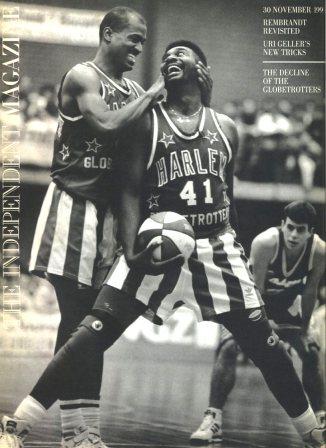
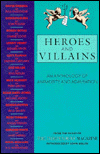
"To read Poe is to step on to another planet. There is no landscape like it. And no story more perfectly embodies his genius than the half-dozen or so pages of 'The Masque of the Red Death'... There's nothing in the narrative which relates to my personal experience, either then or now. The story confounds any assumption that for dark fantasy to achieve its intended frisson it must offer characters and settings the reader can readily identify with. Unlike much current work in the field, which offers the simple and simplistic vision of a contemporary status quo invaded by - and usually overcoming - some alien force, Poe offers the clarity of a fable told in the baroque, hallucinatory style of an opium poet. Not for him the easy chill of suburbia possessed: the lawnmower speaking in tongues, and the youngest returning from the cemetery with his head on backwards. Poe was interested in making myths, and he originated forms by which countless writers have shaped their work. The ground rules for the fictions of obsession, of detection, even, arguably, areas of science fiction, were laid out in his brief, intense tales."
Edgar Allan Poe
Essay by Clive Barker, (i) The Independent Magazine, 30th November 1991, (ii) Heroes and Villains: An Anthology of Animosity and Admiration, 1994
"Thank you so much for the opportunity to be part of your 20th birthday celebrations. I've been a reader of Starburst since its first issue and it's wonderful to see that a magazine dedicated to the kind of creative work that stimulates the imagination is still going strong after two decades. We need our dreams more than ever now. The fiction of the fantastique - whether it takes the form of Science Fiction, Horror fiction or dark Fantasy - has become a profoundly important way to understand an increasingly chaotic world. As a writer, painter and film-maker, I am wholly committed to delve deeper into my imagination for the kinds of images and ideas that will stimulate and excite my audience. I am delighted at the prospect of Starburst being there to report on the journeys I am taking."
Starburst: Twentieth Anniversary Messages
Letter by Clive Barker, Starburst No 232, December 1997
"Encouraged by the sexual freedom of many of the underground films we saw, we put propriety aside and followed our instincts. Flesh, which is so much a part of the stories I have told in the years since, is given a fine showing in these pieces, particularly in The Forbidden. As are images of anxiety and death. The head of John the Baptist, lopped off and presented to Salome for kissing; the body of Faust, laid out on a table by angelic presences and elegantly skinned; a man dressed as a demon moving though a negated landscape; another demon, naked and blank-faced whirling in a dervish frenzy. Some of the images - a board of geometrically arranged nails, a figure out of Vesalius, skinless but perfectly calm - find new forms in later films. In this sense, these brief works are sketches for more elaborate renderings, and both films might be mined for such prefigurings. But they would not, I think, do them great service. Yes, they are certainly scrawls - unkempt and unproficient - but there is a hermetic quality in them both that I almost envy."
Trance Of Innocence
Essay on his early films by Clive Barker, Sight and Sound, Vol 5 No 12, December 1995
"If Crazyface's journey teaches anything, it is that the rich and the
mighty are not any more secure than those they lord over. The laughter
and the high spirits of the piece should never quite drown out the
sound of the four fatal horsemen, coming to claim both the Kings and
the Fools of the world."
Forms of Heaven
By Clive Barker (see Collected Plays) production notes by Clive.
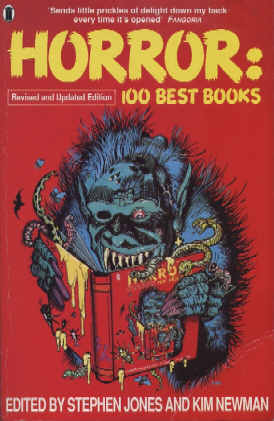

"In travelling the road of a particular story - along which every town will have streets and squares in common, yet none looks quite like the other - the writer may see, with a backward glance, the way the essentials of the tale have been reinterpreted over the years, subtly changing to reflect the interior lives of those who've gone before. The road becomes an index to the blossoming and decay of belief-systems; a book, if you will, of books, in which the subject is both the history of story and the story of history... Perhaps, if he's farsighted, the writer, looking back along the road he's travelling, may even glimpse its beginning (or at least the rocky place from which it emerged), and be enriched by recognition of why the tale he's reinterpreting was first created."
The Tragical History of Doctor Faustus
Essay by Clive, 1988, (i) Horror : 100 Best Books. (ii) Clive Barker's Shadows in Eden.
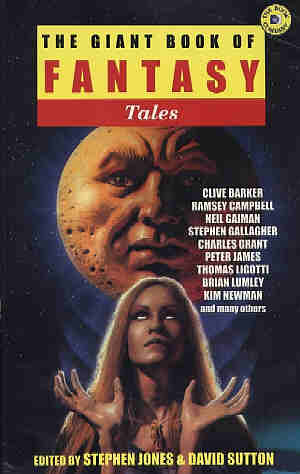
"I have always been pleased that hotels choose a book of
the fantastique, the Bible, for those nights when
the television was dull. Moralists come and go but
stories keep coming back.
"The fiction of our fears is at it's best also a fiction
of transformation and transcendence: seldom comforting,
often paradoxical; by turns hallucinatory and chillingly
detached; one moment an account of tribal origins, the
next poetry and metaphysics. In the beginning was indeed
the word. But only one genre takes such conspicuous
account of the void from which that word was uttered."
Speaking From The Dark/Keeping Company With The Cannibal Witches
Essay by Clive Barker, (i) Daily Telegraph, 6 January 1990 (ii) Deadline, No.23, October 1990 (iii) Pandemonium, 1991 (iv) Fantasy Tales No.6, Spring 1991 (v) The Giant Book of Fantasy Tales, Australia, 1996
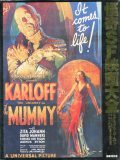
'Take a look at Onibaba, for instance. I heard that it's the only movie William Friedkin studied before he went off to work on The Exorcist. Or Kuroneko, or Kwaidan. Heard of either of those? I saw them in this little sex cinema in Liverpool. They used to run soft-core porn one week and obscure foreign films the next-'
'- and you're trying to tell me you never went when they were playing soft-core porn?'
'Once in a while,' I confessed, 'but given the choice between copulation and agitation I'll always choose the latter.'
'Strange child,' The Spirit said.
A Visitor
Essay by Clive Barker, Graven Images by Ronald Borst, 1992
"Cinematic fear comes in at the ears as well as the eyes. In creating
a film intended to chill and disturb its audience, the function of
sound - more particularly, of the score - cannot be overemphasised.
"Music in horror cinema serves a host of purposes. It warns us to
anticipate the worst. It elevates the terrors when they come to find
us. And it soothes us when those terrors have been driven off, lulling
us into a false sense of security before the next assault.
"All of this is by no means easy to achieve. If the score is
overwrought the drama may simply be rendered preposterous. On the
other hand, the composer's work has to spur the audience into
believing the impossible, so it has to take considerable risks...
"Like the stage magicians who play a central role in Lord of Illusions,
the composer's skills are at their most potent when they go unnoticed.
There are cues on this disc so cunningly scored that they seem as
integral to the scenes as the actors on the screen. Simon's music
haunts our picture. It hovers, it hints, it murmurs, it seduces. In
short, it effortlessly enhances the drama of the tale we're telling,
darkening its darkness and sweetening its glimpses of light."
Soundtrack to Lord of Illusions
Liner notes by Clive to the soundtrack album by Simon Boswell, February 1995.
"People for the Ethical Treatment of Animals (PETA) and I are asking you and the editors nationwide to put your hunting and fishing columns where they belong: on the obituary pages. For decades, 'outdoors' writers with snuff-it-and-stuff-it mentalities have been imposing their true-life horror stories about bagging bucks and snagging trout on newspaper readers. Considering that the majority of Americans today prefer outdoor sports like tennis, biking, and jogging, editors should have long ago banished columnists who write about killing wildlife to the Stone Age scrap heap. Please, at least put these accounts of animal victim's untimely demises in the proper place - with other death notices."
Open Letter
By Clive, addressed to the editors of 100 U.S. newspapers, 1997
"Dear All: First, may I take this opportunity to thank everyone who's
made the new book such a success, and a particularly heartfelt thanks
to all you kind people who are taking time to comment on Galilee,
either in your letters or here on amazon.com. I just wanted to remark
on two observations made here. One, the comments about the typos in
the book. You're right! There are way too many. While I'm not so naive
as to believe that a book - especially a novel as long and complex as
Galilee - can ever be completely error free, I'm determined that we
can do better. I've already instigated a second typo check for the
paperback edition and I've also been able to correct a number of
mistakes myself. Hopefully this will make the next edition cleaner.
I'd also like to answer the question implicit in several of these
reader observations about the possibility of a sequel. Yes, there will
be another book. Just one. It will carry the story of the Barbarossas
and the Gearys to what I hope will be a mind blowing conclusion. That
inevitably means that the ending of this first book leaves some
questions unanswered. I can understand how that might be a little
frustrating (it's a bit like leaving Han Solo frozen alive at the end
of The Empire Strikes Back) but I guarantee that all the threads will
be tied up by the end of the saga. It's just that I love large
canvases and it sometimes takes a while to fill in all the detail.
"That's it for now. Thanks again for all your passion and support.
Books are the closest thing to a mind meld that I can imagine...
"Best Always, Clive Barker."
Thoughts on Galilee
Reaction to Galilee reviews at amazon.com by Clive. 27th July 1998.
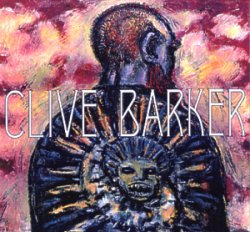
"I very seldom write to the accompaniment of music. But when I paint, which I do every evening, there's always something playing... They're emotional pieces: sentimental, lush, dramatic, melodramatic. They feed my imagination while I mix the colours, make the marks, exult, despair. There's nothing that stimulates my sense of colour, curiously, better than melody; and as long as I'm aware of that process working, I can use it."
Being Music
Liner notes by Clive to the compilation album of his musical inspirations, Songbook Series, EMI 1999




